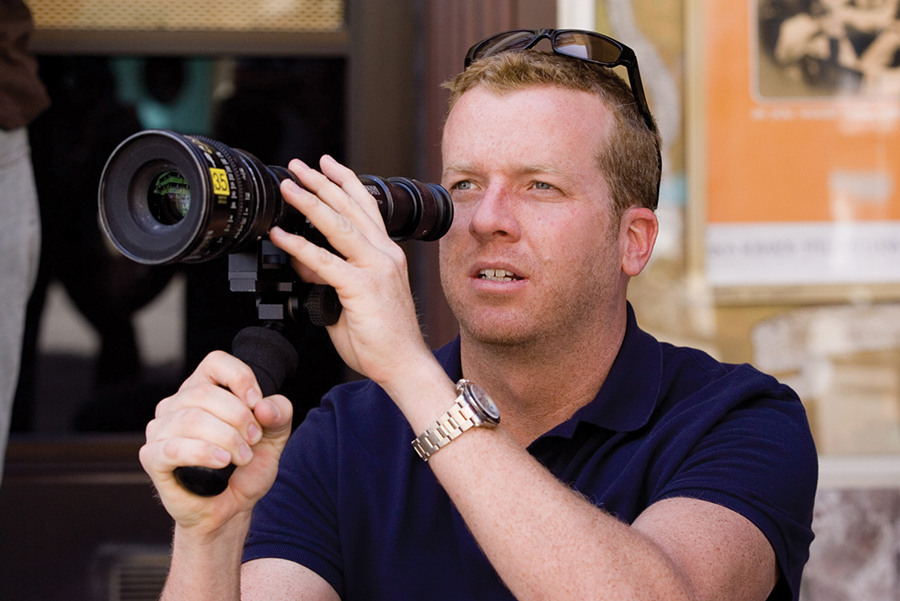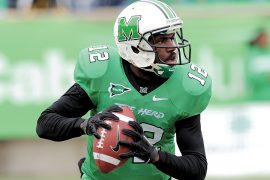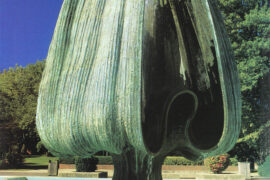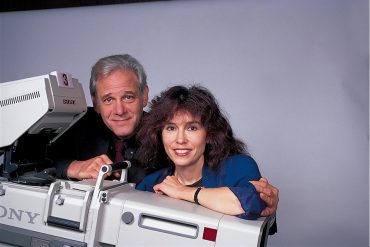Ten years after the release of We Are Marshall, the film’s director reflects on bringing the story of the plane crash to the silver screen.
Interview by Jack Houvouras
HQ 95 | AUTUMN 2016
When it was first announced in November of 2005 that the director of the forthcoming We Are Marshall motion picture was a young man from Los Angeles by the name of McG, many Huntingtonians were concerned. After all, McG didn’t sound like the name of a reputable filmmaker. But the handsome red-haired director, born Joseph McGinty Nichol, soon won over the hearts and minds of the biggest skeptics. In the end, the Marshall University and Huntington communities could not have asked for a better person to take the reigns of the overwhelming project that tells the story of the 1970 plane crash.
Previously known for his award-winning work in the music video industry and his direction of two Charlie’s Angels films, McG was seen as a rising star in Hollywood. Warner Bros. knew what most Huntington residents would learn over time – that the young director would bring an enthusiasm, energy and, most importantly, sensitivity to the project.
With an unbridled passion for both the Huntington community and Marshall University, McG quickly became a local fan favorite during the spring of 2006. At an April 1 block party on Fourth Avenue that preceded three weeks of filming in Huntington, a crowd of nearly 10,000 turned out to welcome the stars to town. When McG took the stage and led the crowd in an energetic “We Are … Marshall” cheer, he was greeted with a thunderous ovation usually reserved for the likes of heartthrobs such as Matthew McConaughey. Taking all of this in, Academy Award-nominated actor David Strathairn turned to the young director and said, “You know, McG, they’re going to elect you mayor here.”
Throughout the weeks of filming that took place in Huntington, McG could be spotted all over town interacting with fans and onlookers. When he wasn’t putting in 20-hour days, he was taking the time to attend community functions or inviting a family member of someone lost in the plane crash to join him on set and watch the filming process. He often took the time to listen to their input and, when asked, would re-shoot a scene to improve the film’s authenticity.
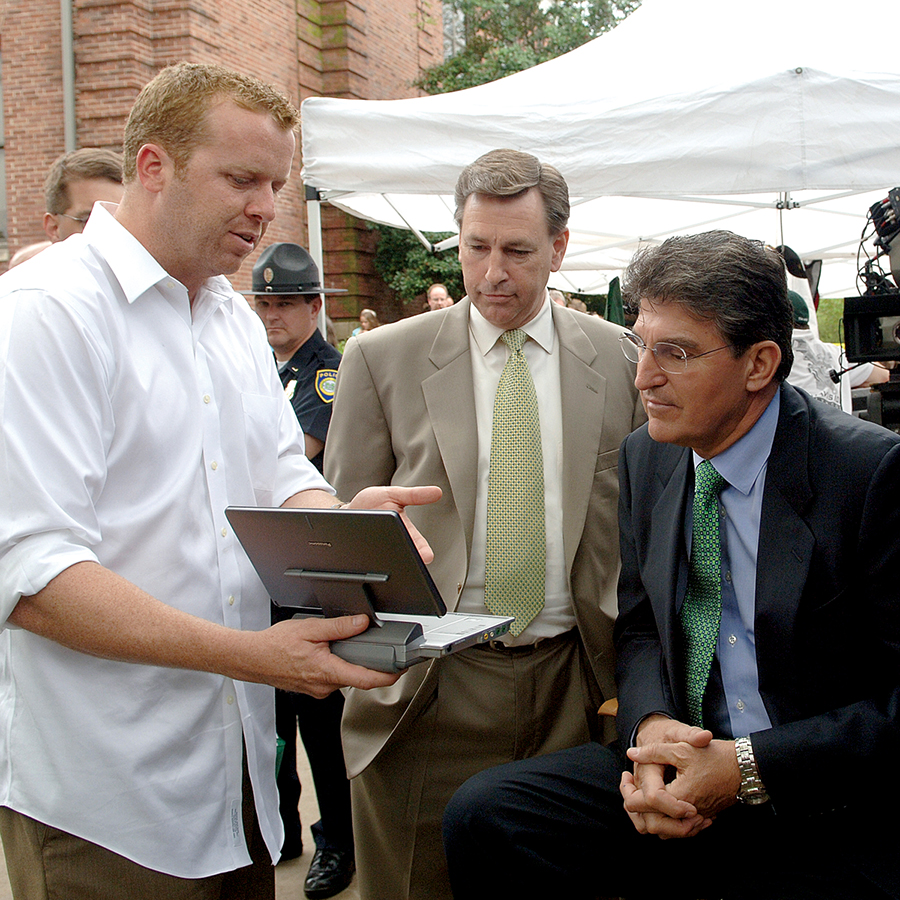
We Are Marshall was released in December of 2006 and garnered its fair share of glowing reviews:
“McG shows new maturity. Scenes that could have been played for ghoulish effect, like the plane crash and its fiery aftermath, are handled with skillful efficiency.” – Jessica Reaves, Chicago Tribune
“This is the rare football drama (Friday Night Lights is another) that gives you a sense of what football means to a town.” – Wesley Morris, Boston Globe
“This sense of triumph, more palpable because it’s true, should touch even the crustiest of cynics.” – Lawrence Toppman, Charlotte Observer
“Equally thrilling and wrenching, the film is an absolute must for anyone who loves sports and an eloquent explanation for those who don’t understand what the fuss is about.” – Connie Ogle, Miami Herald
“This unforgettable and incredible true story of tragedy and triumph in the face of overwhelming odds is a striking testament to the power of the human spirit.” – Pete Hammond, Maxim
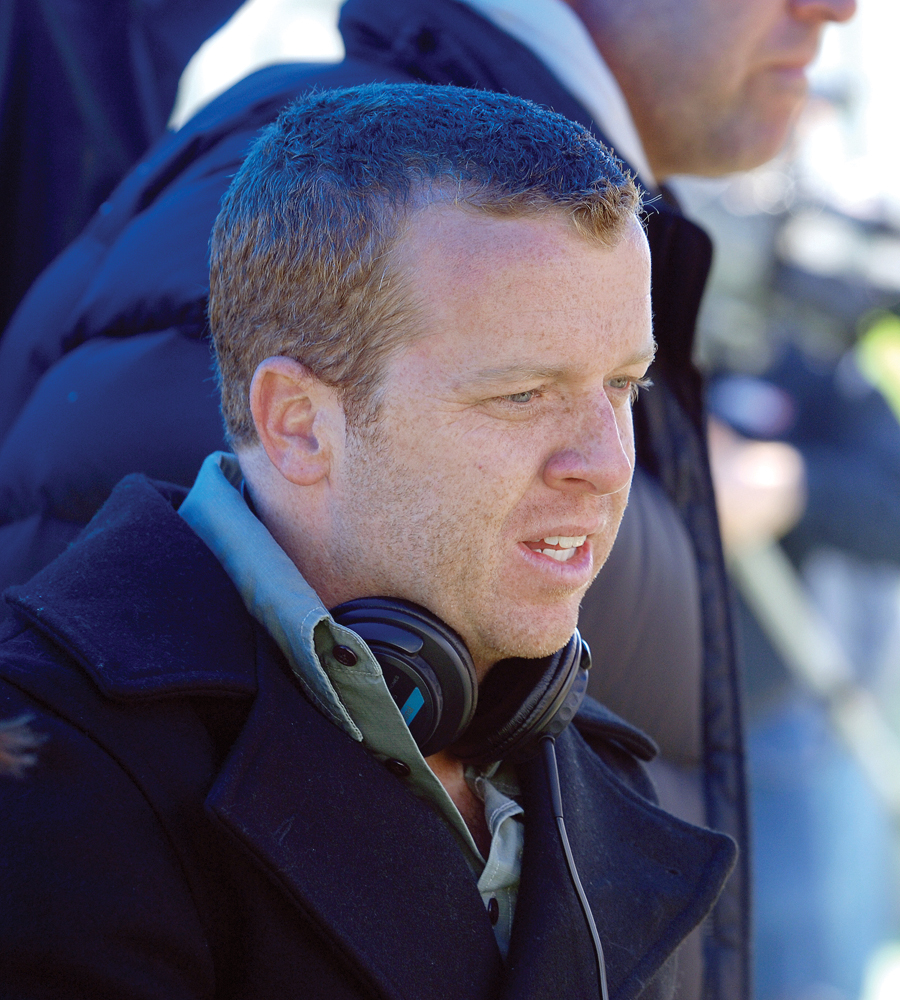
In the 10 years since the film was released, McG has been immersed in a variety of projects. He directed Christian Bale in Terminator Salvation, Kevin Costner in 3 Days to Kill, and Reese Witherspoon in This Means War. He has also produced several television series including Chuck, Nikita and most recently Lethal Weapon. In January, it was reported that McG will direct the film Masters of the Universe.
In late September, Huntington Quarterly Editor Jack Houvouras reached out to the busy producer/director to ask him 10 questions about the film he made 10 years ago. The honesty and candor of his answers didn’t disappoint.
What was the hardest part about directing We Are Marshall?
[Pause] Certainly it was being sure to represent the community and the families accurately and honorably. That was my absolute goal. The first time I ever landed at Tri-State Airport I drove into town and started to meet everybody involved with Marshall University, the families of those lost in the plane crash and the community. It became my singular focus to do an honorable job so I could look everybody in the eye and feel good about what we had created together.
Were there any light moments while making such a serious film?
There were a few. I remember getting my ass kicked by Matthew McConaughey at 35,000 feet on the Warner Bros. plane. We were flying back to Los Angeles when I thought, just for a minute, that I might be stronger than him. But, I learned the hard way that he’s “country strong” and he put me in my place all too easily. So I got beat up by McConaughey and he’s never let me forget it since.
Many have said Matthew McConaughey’s role in We Are Marshall was the first time he was seen by film critics as a serious, dramatic actor. He went on to win an Academy Award in 2013 for Dallas Buyers Club. Does that make you proud?
I don’t know that I deserve that much credit but I am happy for, and proud of, my friend Matthew McConaughey. I think he did a great job in our movie, and I think that could be regarded as the beginning of the “McConaissance.” [Laughs] If that is the case, then I’m happy to have contributed to it and played a part in a small way. The guy’s an unbelievable talent, and he has been all the while. It was great to see him get his day in the sun and be recognized as the talent that he truly is. He brought that talent to We Are Marshall every day on the set, every day in preparation and every day in post-production. He never stopped taking the film seriously. He gave it everything he had. He would tell me it was the best filmmaking experience he’d had up to that point in his career. I can’t speak to his films since then, but I know he was very proud of his efforts on We Are Marshall.
Other actors in the cast have also found great success in the years that followed: January Jones in Mad Men; Anthony Mackie in The Hurt Locker, Avengers and Captain America; and Kate Mara in Shooter, House of Cards and The Martian. Do you still keep in touch with these cast members and what are your thoughts on their success?
I do keep in touch with all of them. A film is like a family, much like the Huntington community is like a family. We all took the responsibility of telling the story very seriously. It connected us in a way that brings a smile to all of our faces every time we see one another. Obviously, Kate Mara has a very special connection to the game of football in that her father’s side of the family owns the New York Giants and her mother’s side owns the Pittsburgh Steelers. It’s in her blood. That was always her point entry of authenticity to the film. You’ve seen McConaughey and his passion for Texas football. I saw January Jones not too long ago and we talked about her family and her child. It’s great we’ve all stayed buddies. This is all based on the camaraderie we established when making the film.
What are your three favorite scenes from We Are Marshall?
I really have to think about that. [Long Pause] I love the scene with Anthony Mackie and Matthew McConaughey when they are alone in the locker room – after Nate Ruffin’s character injures his shoulder. I thought both of them did a great job. I love the chapel scene with Matthew Fox and McConaughey. And my third choice would be the final play of the game against Xavier. But, that scene is a double-edged sword in that I feel both pride and shame. I’m very happy with the emotion from when the ball is in the air and we flash back to the past that got us there. I think it does a great job of reminding the audience of the human experience and what it means to have pain and joy – everybody is going to have both along the way. But, I’m mad at myself for filming the final play inaccurately. It’s something I think Coach Lengyel has every right to put his boot in my backside over. For the end of the game against Xavier, I wanted the drama of a pass play to the end zone for the purposes of cinema. But in reality the final play was a screen pass and run that resulted in a touchdown, which isn’t as dramatic. I made a creative decision because I thought it would be the best way to show the emotion of the victory. It has haunted me to this day. I wish I would have done it differently and made it equally dramatic by honoring the truth of the play itself.
What are some of the things you like most about the city of Huntington?
My family is from York, Pennsylvania, so I feel right at home in Huntington. It’s my kind of town and my kind of people. Honest people, good people, charitable people, people interested in the well being of others. It’s a straightforward, no-nonsense kind of town. I can’t tell you the peace I felt with the river, the moving water, the seasonal change and the peace of the countryside. Everything about the way the campus is laid out. I had such a great time.
What are some of your memories from the green carpet premiere in Huntington?
Well, tremendous pride first and foremost. And then there was the bat flying around in the Keith-Albee Theatre before the movie began. [Laughs]. I thought that was charming. The Keith-Albee is a great theater, and we used it in the film itself. It all felt authentic and it felt great to do it right. And I liked seeing Huntington have its day in the sun. I have a foot in Hollywood and I have a foot in Middle America, so it made me smile to see a town that deserves so much praise for what’s right in our nation get its proper recognition. That was one of the most unforgettable nights of my life and I’m forever humbled and honored by that night.
In an interview with Fast Company magazine in 2009 you revealed you suffer from agoraphobia, and that it once prevented you from directing a film in Australia. In what other ways has it affected your work and your life, and what have you found to be most helpful in managing the condition?
Well, it was one of the things that drew me to the material of We Are Marshall. I knew I’d have to stare into the belly of the beast. I had to find the courage to fly into that very airport and face my fears. Sure, it’s a movie about the triumph of the human spirit, but it’s also about a plane crash and the devastating effect on a community. I’d be flying into the airport where to this very day there’s still a bald spot on the hillside. The first thing I ever did when I landed in Huntington was go to the crash site and pray. I reflected on the lives lost and I tried to call upon the strength and the spirit of the community to give me the strength I would need to do a good job. Not many people know this, but there was a lot of pressure from the studio to not film part of the movie in Huntington because of the added expense. But I insisted. I was adamant that we do all the exteriors and everything that mattered in Huntington. Regarding the agoraphobia, when I first went public with the condition I felt kind of ashamed. Since then I’ve come a long way. I’ve been around the world many times now and I enjoy flying. I’m very proud of overcoming that personal burden. I’ve sort of reconciled that the person I am that has this shortcoming is the same creative person that I hope tells good stories and brings people together. I don’t beat myself up as much as I used to. It’s no different than if you had diabetes or had a really bad weight problem. You can get your blood sugar under control, but if you don’t do what your supposed to do it can flare up. You can lose 100 pounds, but if you don’t do what your supposed to do it can come back. Agoraphobia is a cruel disease, but the good news is if you work hard you can overcome it.
What upcoming directing or producing projects are you excited about?
I’m very proud of the way Lethal Weapon turned out in a television capacity, and right now I’m writing the script to Masters of the Universe, so I’m going to take that whooping McConaughey put on me and bring it to the He-Man character. [Laughs]
Ten years later, what do you take away from the experience of making We Are Marshall?
I think it’s the best movie I’ve ever made and it’s aged very well. It had mixed critical reviews, but in retrospect it’s right there with some of the great films of its kind in that it’s fondly remembered. I’m very pleased with the job everybody did on that film. In addition, I will always remember how the people of Huntington took me in and welcomed me into their community. I miss them all so much. I have such fond memories. I really want to come to a game this year and would love to see everybody at a home game. It’s such a happy moment in time. I’d love to just walk around the streets and reminisce and soak in the one-of-a-kind spirit of Huntington and Marshall. It means the world to me and I carry it with me every day. I’m so very proud to have been a small part of the story of Huntington, West Virginia, and Marshall University.

